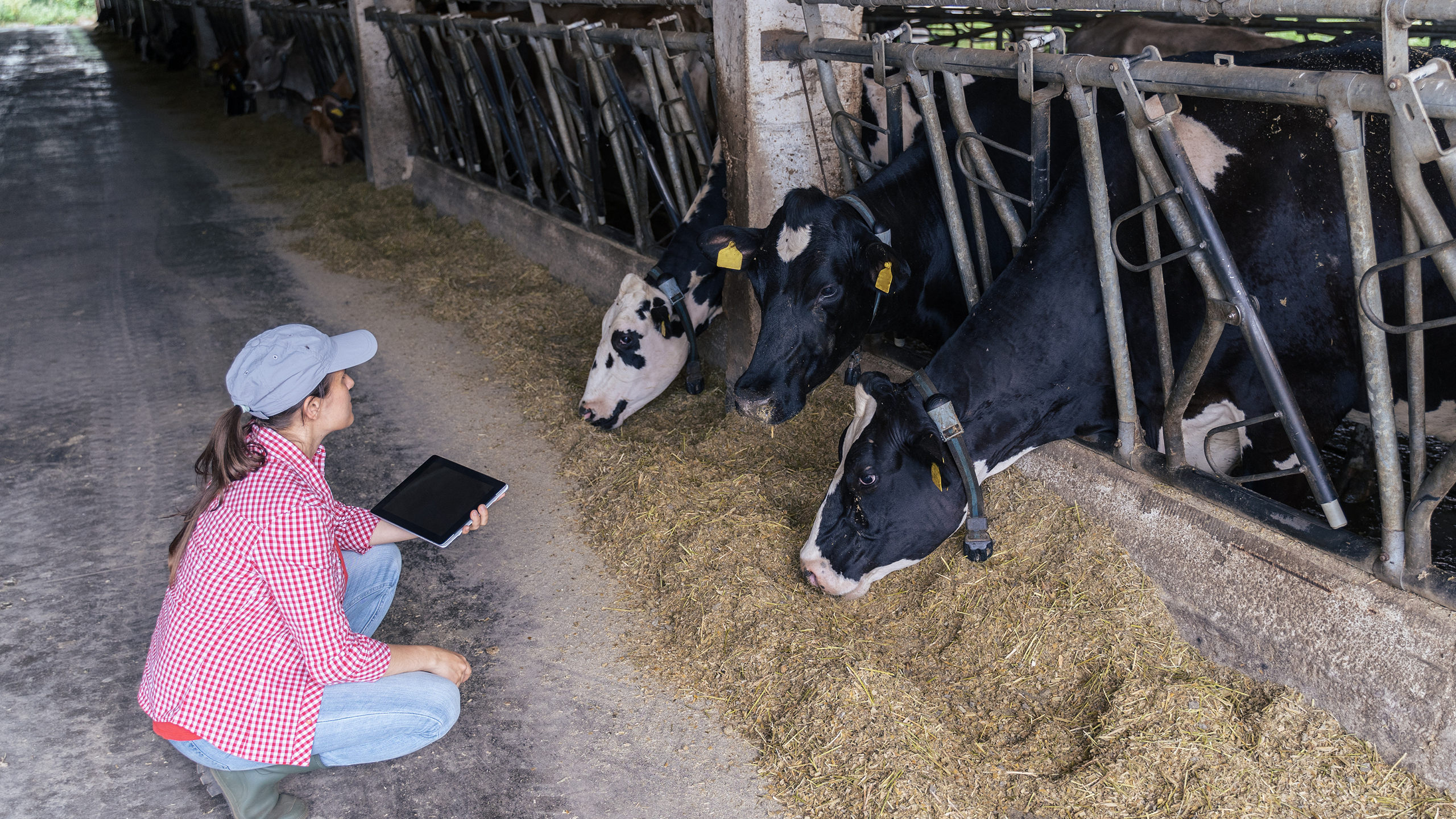Serving southwestern Ontario for more than 55 years, Kindred Credit Union has developed strong ties to local agricultural communities. Kindred is cooperative banking that connects values and faith with finances, inspiring peaceful, just, and prosperous communities. Part of banking with purpose within the agricultural community means that we’re invested in understanding and supporting the ‘bigger picture’ so we can help our members and communities thrive, both today and in the future.
In alignment with our commitment to Climate Action and Community Food Security, we believe those connected to the food system have a role to play in understanding the relationships between agriculture and environmental protection, and contributing to the sustainability of farmer livelihoods. The connection among Kindred’s areas of focus is explored in our Community Inspiration Framework.
Kindred connects with a variety of approaches and experiences related to farming and, as an institution that serves members across the spectrum of agricultural practice, we have an interest in understanding the common ground as we work towards community food security and sustainable food systems.
Angie Koch and Mark Reusser are both farmers in Waterloo Region. Angie is the owner and farm manager of Fertile Ground, a market garden operating a Community Shared Agriculture (CSA) model, and she’s a member of the Ecological Farmers Association of Ontario. Mark is a turkey farmer, vice president of the Ontario Federation of Agriculture, and co-chair of the Thames River Phosphorus Reduction Collaborative. While their approaches to agriculture differ, both are invested in finding common ground.
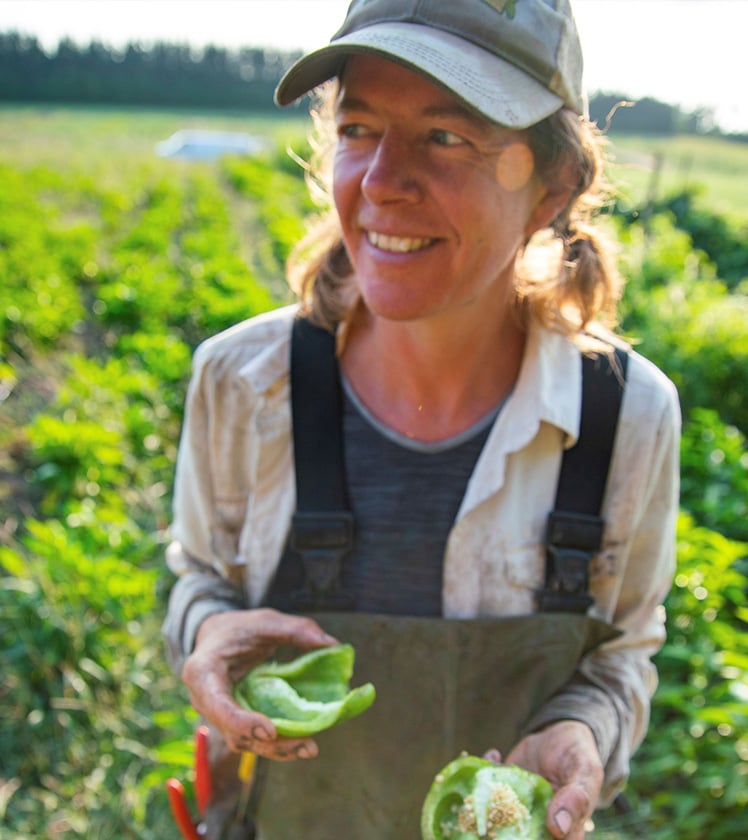
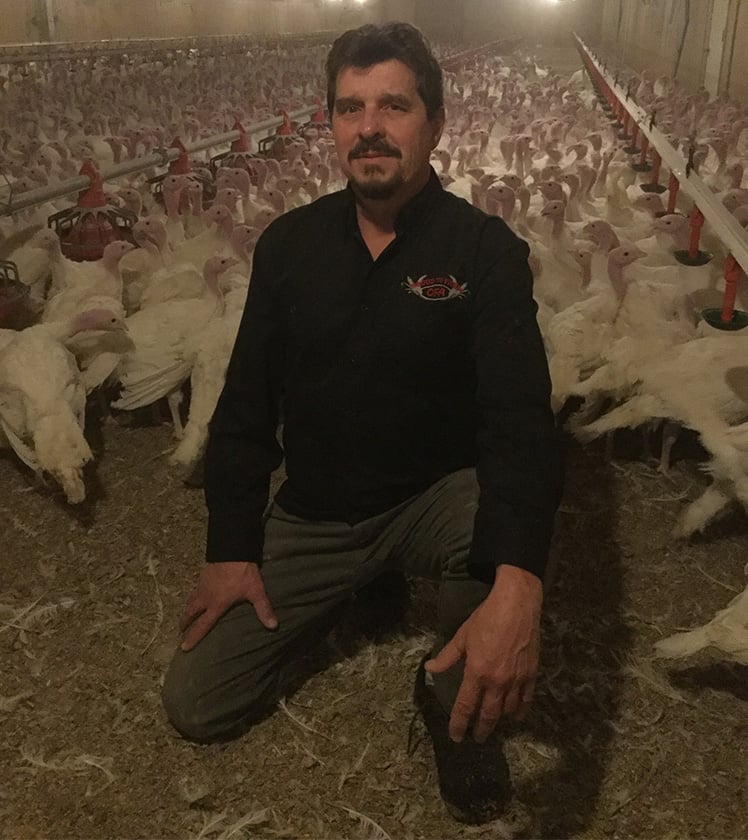
How do you farm?
Angie explains that Fertile Ground is “trying to find a balance between having a viable farm operation, while also having a socially-connected farm with an awareness of the way my farm practices impact water systems, soil systems and the general surrounding ecosystem.”
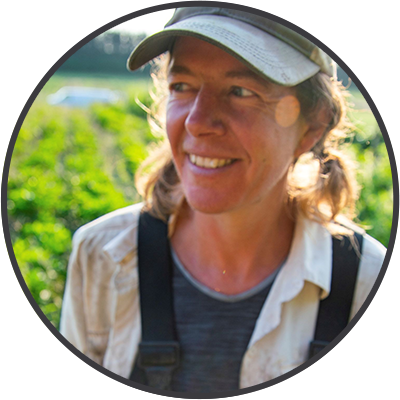
Trying to find a balance between having a viable farm operation, while also having a socially-connected farm with an awareness of the way my farm practices impact water systems, soil systems and the general surrounding ecosystem.
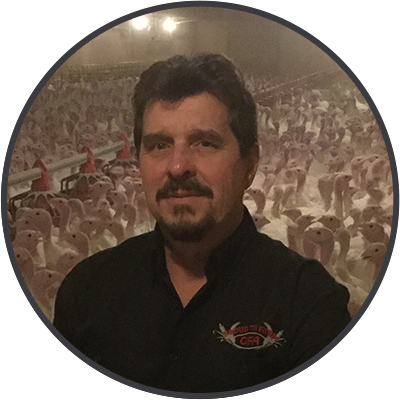
I will utilize antibiotics; if I can alleviate suffering, I will do it in a minute. I will also use an insecticide to get rid of whatever may harm my livestock. That said, I absolutely try to minimize it on my field crops and do my best to be gentle on the land.
Mark describes his practice of farming as a combination of conventional and non-conventional approaches. “I will utilize antibiotics; if I can alleviate suffering, I will do it in a minute. I will also use an insecticide to get rid of whatever may harm my livestock. That said, I absolutely try to minimize it on my field crops and do my best to be gentle on the land.” He emphasizes his belief that some land should be left in its natural state. “For example, I leave my fencerows as wildlife corridors. I can live with some loss along the edge; I look at that as part of being a farmer.“
What does it mean to farm?
In independent conversations with Mark and Angie, it’s clear they have a shared pride in producing food and being part of the larger agricultural community, whether they approach farming conventionally or ecologically.

I farm because we all need to eat. If I want to make an impact on the health of the world, the health of communities, the health of human bodies, and the health of ecosystems, then a focus on food production allows me to make an important difference.
Neither Mark nor Angie grew up farming, but today it’s a vocation that’s deeply meaningful to them. They both came into this industry with a passion to produce food and make an impact. As Mark explains, “When I was six, I remember thinking this is where I should be”. Angie adds, “I farm because we all need to eat. If I want to make an impact on the health of the world, the health of communities, the health of human bodies, and the health of ecosystems, then a focus on food production allows me to make an important difference.”

I think there’s a genuine love and pride in producing something. You’re a partner in producing food with the environment; you’re working with a living, breathing system.
“There’s a real pride that you hear amongst farmers of all stripes.” The focus may be different for each farmer, “but a lot of it comes down to the importance of the work being done and the contribution to the community at large through what is being produced”, Angie notes. Mark echoes that sentiment: “I think there’s a genuine love and pride in producing something. You’re a partner in producing food with the environment; you’re working with a living, breathing system.”
While there may be a shared sense of accomplishment in producing food, barriers and tensions are evident across the sector. These lines are mostly drawn along conventional versus ecological approaches to production.
Tensions in agriculture
Financial tensions
Farming is a vocation; it’s hard work and it’s a lifestyle. That said, people need to be able to turn farming into a viable business so that they can build a life around it.
Both Angie and Mark expressed the need to earn a decent livelihood as a core tenet of their farming practice. “Would I grow food for other people if I couldn’t make a living doing it? I’d still have to make a living somehow,” says Mark. The amount of money farmers make can be a touchy subject. “I don’t really understand why this is an issue for farmers and not for other professions. If I have to provide food so cheaply that I can’t make a living doing it, how can I continue? We need to be able to support ourselves. The ebb and flow of uncertainty can be massive and it can feel like a gigantic burden. When it doesn’t rain for four weeks in the summer, it is really hard. The level of stress and anxiety is high.”
Angie shares that Fertile Ground’s direct sales to their customers allows for open exchanges that can mitigate the stress, even the economic risk. She tells us that “when things go well in the field, we have people to celebrate with and when things don’t go well, we’re able to explain what is going on. We get some buy-in. I feel like there is a lot of grace with our customers—they understand that they’re sharing risk with us, that’s part of participating in a CSA. But, they also share the bounty!”

There’s tremendous pressure to be productive. I’m not sure Canadians understand that farmers compete with the world. In a commodity system that’s so driven toward quantity, farmers have to produce a certain amount just to survive. If you can’t be productive, you’re out of business.
In the wider farming community, the need to produce a margin can push farmers to value yield at all costs, even if there’s an ecological price to pay. “There’s tremendous pressure to be productive,” says Mark. “I’m not sure Canadians understand that farmers compete with the world. In a commodity system that’s so driven toward quantity, farmers have to produce a certain amount just to survive. If you can’t be productive, you’re out of business.” Mark believes this is particularly true for those who are just starting out: you need every penny and your business may not have the opportunity to do what’s best for the environment. “If you’re producing without the use of modern technology, you have to charge more for your food. Organic food costs more, because it has to cost more—it’s harder to produce and there has to be a margin. Yes, every farmer should be using the best management practices, but every best management practice costs money. Some people can afford to do things others can’t.”
Mark shares that small and medium-sized farms struggle to compete with the ever-increasing size of already large farms. “The big get bigger because they’re so good at production; they’re so efficient. They use all the latest technology to be able to produce more and, consequently, they can pay more to buy and rent land. If I’m a small farmer, how do I compete against that? Industrial operations have a huge advantage and I only see it growing.”

Commodity prices are challenging. I’m sure there are compromises that are being made because there are so many limitations in being able to control the value of a product. There is a pressure that comes from global price setting.
Angie empathizes, saying, “Commodity prices are challenging. I’m sure there are compromises that are being made because there are so many limitations in being able to control the value of a product. There is a pressure that comes from global price setting.” At the same time, Angie also questions “how much is ‘this is the way we’ve always done it?’ Or is there just a different understanding of how harmful chemicals truly are?”
Ecological tensions

I get frustrated when I see the negative impacts of agriculture on insects, biodiversity, water systems, and the erosion of top soil—and it doesn’t seem like there’s a lot of appetite to change that, fundamentally. I don’t understand the differing perspective that makes conventional practices seem palatable, because I don’t think anyone is deliberately trying to mess up these ecological systems.
Angie wonders how other farmers view their responsibility to the ecological systems their farms touch. “I don’t get the sense that most farmers think they’re having really destructive effects on ecological system, but that’s what it looks like. It looks like this blatant disregard from people who should understand how integrated and finely balanced natural systems are because they work within them all the time.” She shares that, from her experience, in general farmers are incredibly in-tune with the ecological system. “You can’t farm and not notice these things. You can’t succeed as a farmer unless you have a good ability to observe your surroundings, understand how things are connected, and make adjustments. I don’t understand the seeming inability to place a farm system within a broader system and understand all of the downstream effects. I get frustrated when I see the negative impacts of agriculture on insects, biodiversity, water systems, and the erosion of top soil—and it doesn’t seem like there’s a lot of appetite to change that, fundamentally. I don’t understand the differing perspective that makes conventional practices seem palatable, because I don’t think anyone is deliberately trying to mess up these ecological systems.”

Soil tests show that organic matter in soil continues to decline and yet collectively we’re not doing enough to maintain our soils. We’re good at using technology, but there’s always a price to pay. At some point, you have to preserve the environment or the very place we live is finished. And what’s the point in that?
Mark shares a similar, yet more muted sentiment: “All farmers say they respect the soil. Personally, I respect the soil and I think you should leave the soil better than you found it (or at least the same)—but how often does that really happen? Soil tests show that organic matter in soil continues to decline and yet collectively we’re not doing enough to maintain our soils. We’re good at using technology, but there’s always a price to pay. At some point, you have to preserve the environment or the very place we live is finished. And what’s the point in that?”
One solution Angie offers is for farmers to think about the relationship between managed land on the farm and the wild land around their fields, and the resulting relationships within the soil. “How do we get what we need out of the ground without decimating microbial populations? How do we keep soil covered so there’s food for all critters, but not have pests destroy our crops?” She works to find a balance, making decisions she feels have integrity, while still allowing her to build a viable business. “We have ten acres of arable land. I choose to grow on about four acres every season and the rest is managed cover crop rotation. We’re putting an effort into managing crop land in fallow and giving it a lot of rest. We don’t make money off of that land, but when we rotate back into that space, it’s more productive. We’re building the soil and we can see the difference in the long term.”
Mark offers another idea for the regeneration of our soil: livestock. “A lot of our farm land has not had livestock on it, or had livestock products [manure] supplied to it, in the past 50 years. I look at it as a virtuous cycle. If you don’t have livestock in the cycle it becomes difficult to maintain soil health. If you weren’t harvesting crops, the soil would regenerate by itself. As long as you’re pulling a crop, you have to put something back. It’s like your credit union account, if you continually withdraw, it’s going to be empty. We’re not doing it right yet; well some are, but we all aren’t.”
Angie explains that the design and diversity of Fertile Ground minimizes the pressure that other farms may experience. “Diversity decreases the intensity of pest and disease threats, and that diversity becomes our security system. If we do get hit by pests or a crop-specific disease, we might miss a harvest, but we still have 31 others crops to rely on. We’re able to let things go and not have to take extreme action. This minimizes our dependence on fertilizers, pesticides, and other heavier practices. It’s much different than other types of farms that specialize with a smaller list of crops. They are very dependent on each of those crops doing well, which really impacts the types of decisions they have to make.”
There’s also a tension in what society is willing to contribute to sustainable practices. There has to be a market for it and you have to be willing to pay for it, Mark highlights. “As long as I can make a margin and make a living, I’ll be more than willing to produce food in a different way. I think many farmers feel the same, but there has to be a market for it,” says Mark. “Whether we like it or not, we’re stewards of the environment. Farmers own most of the land in southern Ontario; if we don’t look after the land, who will? Society benefits from having natural spaces, but if you want farmers to maintain that land, somehow they have to be paid. It’s an investment in the soils of your country and in food production, forever. There‘s a cost to everything. It depends where society wants to go with it.”
Cross-sector tensions
Those who choose to operate their farms outside of the mainstream can be met with judgement or outright distrust. Angie shares, “I often feel written off when talking to larger-scale producers, as though what I’m doing doesn’t have an impact on the broader world, and I disagree. I wonder if conventional producers feel judged, like they’re not being stewards or they’re acting irresponsibly. When people feel judged, they can get defensive and stop listening.”

Everyone has the right to their own beliefs, so to impose your standards on other people is problematic.
Mark notices that there can be finger pointing without seeking to understanding the practice or reasoning. “Everyone has the right to their own beliefs, so to impose your standards on other people is problematic.” We all need to listen more, to try to understand and see if there’s something we can learn. What opportunities are there for moving forward together?
Angie shares that this tension extends beyond the practices of individual farming operations and out to their [conventional versus ecological] supporting associations. “The structure of our organizations actually separates us from each other, so we don’t interact much and then we can’t learn from each other’s practices. Sure, there are huge differences in the way we operate, but there are a lot of similarities too. As it stands though, the idea of an organic farmer and a conventional farmer sitting down to have a conversation about farming is quite unlikely.”

there’s such an opportunity for education and connection to create mutual respect and understanding. If some of the organizations that represent and facilitate education for different groups of farmers could work together, we could have practical action that would be really helpful.
Angie shares that “At different scales, the various farming communities don’t have a lot to do with each other,” yet “there’s such an opportunity for education and connection to create mutual respect and understanding. If some of the organizations that represent and facilitate education for different groups of farmers could work together, we could have practical action that would be really helpful. How do we come up with a smarter way of doing things that builds on the strengths of both models?”
Questions abound. “What best practice can I use to increase the health of my soil? Which best management practices give me the best bang for my buck? How do I deal with the increasingly extreme weather events that are hitting us as climate change advances? How can I utilize cover crops effectively? How can we work together to claim financial compensation for nurturing our future?” Both Mark and Angie believe they have practical, technical lessons that others can learn from. And, in some cases, exploring new best practices might also increase the economic viability of a farming operation.
Angie is interested in “finding that place where efficiency and scale meet with ecological concerns. I see it as an ideal, scaling up enough to take advantage of efficiencies, productivity and yield maximization but keeping it small enough that you can have those human connections and tell the stories to connect with people directly; to find your niche in the landscape instead of just being the landscape.”

We need to forge human connections between farms that have different practices and scale. We need to see each other as allies and draw on each other’s strengths. In doing so, perhaps we could also offer a challenge that can be heard.
“We have to produce food in efficient ways,” she continues. Fertile Ground produces over 30 crops—the diversity offers both ecological and economic benefits—yet, it prevents them from being efficient with any one crop. “I would love to learn pure production methods from large-scale farmers, but I don’t have contacts in the larger production world. We don’t have a lot of ways to learn from each other. We need to forge human connections between farms that have different practices and scale. We need to see each other as allies and draw on each other’s strengths. In doing so, perhaps we could also offer a challenge that can be heard.”

I think farmers should be willing, able, and encouraged to communicate with everyone who’s interested in their food. If you’re honest and open, you can build empathy.
There’s an opportunity for education within food production. “Farmers have an opportunity to be bridge builders, to make that connection,” Angie offers. Telling your story can be the link that builds compassion, understanding, and support. That’s one of the things we do well here at Fertile Ground.” Mark echoes, “I think farmers should be willing, able, and encouraged to communicate with everyone who’s interested in their food. If you’re honest and open, you can build empathy.”
Where do we go from here?
Whether it’s through production, distribution, or consumption, “food is a natural connecting point,” says Angie. At Kindred Credit Union, we’re deeply interested in unpacking how we can collectively lean into the connections that food creates and exploring how bridges can be built to find our common ground.
We see that everyone connected to or benefiting from the food system has a role to play in forging these connections, building communities of mutual learning, and importantly, sharing accountability. How do we listen with intent so that we can have open, meaningful conversations? How do we value and compensate ecological protection within the agricultural community? How should we be holding each other accountable for the impacts on our shared ecological and social systems?
One way we can learn and foster a sustainable path forward is by inviting various perspectives to the table, as we have here. We invite you to keep the conversation and learning going by getting in touch with feedback, offering your ideas, or expressing interest in joining us on this journey. Contact Amy Zavitz, Community Engagement Specialist.
Join the conversation!
- What is your connection to farming?
- Does this conversation resonate with you?
- What do you agree with? What don’t you agree with?
- Have you had similar conversations in your community?
- What do you wish could happen?

